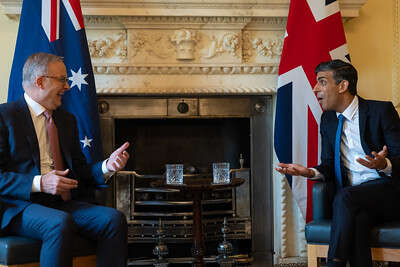
The UK has agreed a free trade agreement (FTA) with Australia following its departure from the EU. From the end of May, the FTA will allow for the free flow of data, provisions for small to medium businesses (SMBs) and protections for UK investors.

According to the UK government, British businesses will be able to “reap the benefits” of the FTA, with bilateral trade with Australia growing by 53% in the long term. The trade deals also fit within Prime Minister Rishi Sunak’s pledge to drive innovation within the UK and grow the economy.
The UK will be able to receive “unprecedented access” to services as well as benefit from digital trade, which the government says has been stripped of red tape. UK professionals will also find it easier to live and work in both countries.
The FTAs will come into effect within weeks of the concluded negotiations between the UK and the Comprehensive and Progressive Trans-Pacific Partnership (CPTPP). The free trade area is worth £9 trillion.
Kemi Badenoch, UK business and trade secretary, said that the trade agreement, as well as the FTA with New Zealand, will forge a “bold new future” for the UK alongside the world’s “most dynamic and fast-growing economies.”
“Putting these trade deals into action will help create new opportunities for business, boosting wages and helping spur economic growth,” Badenoch said.
UK and Australian trade deal revolves around services
The government says that the FTA has been written with services in mind. Services account for 80% of the UK’s economic output and workforce and the government considers it the country’s biggest export success story.
Scientists and researchers will have access to Australian work visas without being subject to its changing skilled occupation list. British people will also be able to work more freely in New Zealand through UK service suppliers to deliver contracts.
UK businesses will also have equal footing to compete for Australian public sector contracts, worth £10bn per year.
The FTA will enable traders who do not reside in Australia to locally store or process data to conduct business there. This reduces the cost to businesses and promotes the free flow of data.
Businesses will also receive protections so they can trade digitally. The sharing of software source code and encryption keys will not be required to access the Australian market, meaning the intellectual property is protected.
Both countries have also committed to continuing to build up their cybersecurity response capabilities as well as strengthen collaboration mechanisms. This comes after Australia’s consultation on its 2030 cybersecurity strategy concluded in April, and follows a number of high-profile incidents where Australian businesses have been hit by damaging security breaches.
UK investors protected by national treatment provision
According to the FTA, UK investors and their investments will be protected from nationality-based discrimination. This means that Australian investors will not be treated more favourably.
The transfer provision will also ensure the free movement of capital and returns (profits) relating to investments in and out of the UK and Australia. The government says that this will increase the openness of both markets and increase certainty for investors.
In 2021, the outward stock of foreign direct investment (FDI) from the UK in Australia was £41bn accounting for 2.3% of the total UK outward FDI stock. The inward FDI was £16.1bn.
Phil Straw, CEO of SoftIron, a UK company with operations in Australia and New Zealand, told Tech Monitor that the new deal between the UK and Australia will mean a lot more free movement for workers in the UK and Australia, which could mean they can share knowledge and skills. The hardware manufacturer recently opened its first IT manufacturing facility in Australia.
“The FTA […] provides for a much broader scope of technologies, research and information sharing between the two nations,” Straw says. “As a globally distributed organisation, we also expect that the provisions under Chapter 11 of the FTA will facilitate more opportunities for our team to freely operate between the UK and Australia, sharing knowledge and skills.”
Straw says that the speed the deal was negotiated demonstrates the UK can display the agility required to respond to a rapidly shifting geopolitical landscape: “Compare that to the EU/Australia deal that started more than two years earlier and is still to be concluded,” he adds.






